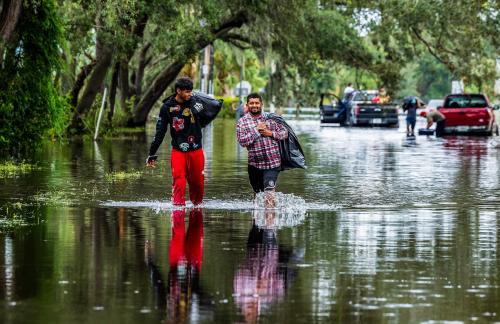Bill Galston makes several good points in his two posts. However, he radically understates the pervasiveness of bottlenecks in the American opportunity structure—and the importance of ameliorating them.
How College Reinforces Bottlenecks
Galston begins by arguing that the U.S. is not a “big test” society. This is true. As I argue in the book, by comparison to most industrialized nations in Europe and East Asia, we have far less of a system in which one’s whole future turns on a single test. Quite a lot does turn on our SAT/ACT. But our community college system, our wider range of colleges, and most colleges’ willingness to admit students older than eighteen make for a relatively pluralistic set of paths to college that other nations should emulate.
But that’s far from the whole story—even in higher education. The U.S. also stands out in a different way: our extremely high cost of college. This has several problematic effects, all of which make money more of a bottleneck in the opportunity structure. In the end, it takes a lot of money to obtain the degrees from respected institutions that so many career paths demand. This, in turn, reinforces the most serious bottleneck in the American opportunity structure: class.
Beyond Qualifications
Galston misses the most serious bottlenecks in the American opportunity structure because he seems only to be looking for what I call “qualification bottlenecks”: key decision points, where having a particular test score or degree is what matters. In our society, the most serious bottlenecks are mostly of a different type. If you need to pass through a middle-class-or-wealthier upbringing, or live in a middle-class-or-wealthier neighborhood, in order to pursue many paths in life, then class and geography are the bottlenecks.
And that is where the U.S. has much to learn from the social democracies of Northern and Western Europe. The U.S. has an unusually stingy and limited welfare state, so almost everything requires significant sums of money. When combined with great economic inequality, this makes class—along with the geography of where one grows up—into a severe bottleneck.
Hierarchy and Pluralism
Galston points out that hierarchy is to some degree inevitable. This is true. But from the point of view of opportunity pluralism, the problem is not hierarchy itself, i.e. that some people are more successful than others. There’s nothing wrong with that. The problem arises when claiming a high spot in one hierarchy is the key to pursuing many other paths—when money, for instance, buys too much of what matters in many domains. A more pluralistic opportunity structure enables us all to choose and pursue different goals. If one good, like money, looms too large, then it becomes the bottleneck that shapes all our choices.
Opportunity pluralism is not the only value. (That wouldn’t be very pluralistic!) But it’s a very important value—not just at the margins, but at the center of most contemporary debates about equal opportunity, as this week’s posts will explore.
Tomorrow: The Early Years Development Bottleneck
The Brookings Institution is committed to quality, independence, and impact.
We are supported by a diverse array of funders. In line with our values and policies, each Brookings publication represents the sole views of its author(s).



Commentary
Reply to Galston: Bottlenecks Are All Too Real in the US
May 5, 2014